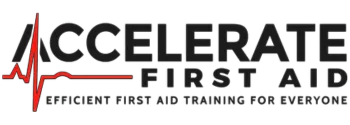
Government-Recognised Asthma Anaphylaxis Training Brisbane: Complete Workplace Compliance Guide
Picture this: You're sitting at your desk on a Tuesday morning when suddenly there's commotion in the break room. One of your team members is struggling to breathe, their face flushed and swollen. Someone shouts "allergic reaction!" and suddenly every eye in the office turns to you - the HR manager, the safety officer, the person who's supposed to know what to do.
Your heart pounds as you realize the training you organized last year might not have been enough. Was it even government-recognised? Do your staff actually know how to use an EpiPen? Are you legally covered if something goes wrong?
This scenario plays out in Brisbane workplaces more often than you'd think. With over 600,000 Australians living with food allergies and asthma affecting 1 in 9 people, the chances of facing an allergic emergency at work aren't just possible - they're probable.
Government-recognised asthma anaphylaxis training isn't just another compliance box to tick. It's your insurance policy against tragedy, your shield against legal liability, and your pathway to becoming the safety leader your company needs. In Queensland, having properly certified staff can literally mean the difference between life and death when seconds count.
This guide will walk you through everything you need to know about government-recognised asthma anaphylaxis training in Brisbane. You'll discover which courses actually meet legal requirements, how to choose a provider that won't leave you hanging, and practical steps to get your entire team trained without breaking the bank or your schedule.
What is Government-Recognised Asthma Anaphylaxis Training?
Let's cut through the confusion right away. Not all asthma and anaphylaxis training is created equal, and in Queensland, that distinction could cost you legally and financially.
Government-recognised training means your courses are delivered by a Registered Training Organisation (RTO) and follow nationally recognised training packages. Think of it like the difference between a university degree and a certificate you print at home - both might teach you something, but only one carries legal weight.
Course Codes Explained: 22300VIC & 22556VIC
22300VIC - Course in the Management of Asthma Risks and Emergencies This course teaches your team how to recognize asthma symptoms, use asthma medications properly, and manage asthma emergencies in the workplace. It's particularly important for industries where dust, chemicals, or physical exertion might trigger attacks.
22556VIC - Course in the Management of Anaphylaxis This focuses specifically on severe allergic reactions that can be life-threatening. Your staff learn to recognize anaphylaxis symptoms, administer adrenaline auto-injectors (EpiPens), and provide emergency care until paramedics arrive.
Many Brisbane businesses opt for combined training that covers both courses - it's more cost-effective and ensures comprehensive coverage for all allergic emergencies.
Government Recognition vs. Private Certification
Here's where things get tricky. You'll find plenty of training providers offering "certified" courses at bargain prices. But here's what they don't tell you: unless it's delivered by an RTO, it won't protect you legally.
Sarah from a South Brisbane construction company learned this the hard way. She'd organized cheap online training for her team, thinking she'd ticked the compliance box. When WorkCover audited her site, they found the training wasn't government-recognised. The result? A $15,000 fine and mandatory retraining for all staff.
Government-recognised training means:
Your certificates are accepted by all Australian regulators
The training meets national standards for content and delivery
You're legally protected if an incident occurs
Your staff receive proper hands-on practice with emergency equipment
Legal Requirements in Queensland Workplaces
Queensland takes workplace safety seriously, and the regulations around allergic emergencies are getting stricter. Under the Work Health and Safety Act 2011, you have a duty of care to provide information, training, and supervision to protect workers from health and safety risks.
For certain industries, asthma anaphylaxis training isn't just recommended - it's mandatory:
Childcare centers and family day care
Schools and educational facilities
Healthcare and aged care facilities
Food service businesses
Any workplace where allergic triggers are present
Even if your industry isn't on the mandatory list, you could still be held liable if an employee suffers an allergic reaction and your team wasn't properly trained to respond.

Who Needs Asthma Anaphylaxis Training in Brisbane?
The short answer? Probably more people than you think. While some industries have mandatory requirements, smart Brisbane businesses are getting their teams trained regardless of legal obligations. Why? Because allergic emergencies don't discriminate by industry.
Mandatory Industries
If you're managing any of these workplace types in Brisbane, asthma anaphylaxis training isn't optional - it's the law:
Childcare Centers and Family Day Care Every Brisbane childcare facility must have trained staff on duty during operating hours. With 1 in 20 children having a food allergy, and childhood asthma rates climbing, this training literally saves lives.
Schools and Educational Facilities From primary schools in Paddington to universities in St Lucia, educational institutions must ensure staff can respond to allergic emergencies. Teachers, support staff, and even volunteers need proper training.
Healthcare and Food Service Healthcare facilities and restaurants across Brisbane are seeing more patients and customers with severe allergies. Your staff need to understand both prevention and emergency response.
Recommended Industries
These industries aren't legally required to provide training, but forward-thinking Brisbane businesses are doing it anyway:
Corporate Offices Mark, an operations manager in Fortitude Valley, got his entire team trained after an employee had a severe reaction to nuts someone brought for morning tea. "The training cost us $2,000," he says. "A workplace lawsuit would have cost us our business."
Manufacturing, Retail, and Construction Chemical exposure, dust, workplace allergens, customer interactions, and insect stings can all trigger severe reactions. Having trained staff means faster response times and better outcomes.
Brisbane-Specific Considerations
Brisbane's sub-tropical climate brings unique challenges:
Year-round exposure to stinging insects and tropical allergens
Intense pollen seasons that can trigger severe asthma attacks
Heat and humidity that can worsen allergic reactions
According to recent Queensland Health data, Brisbane sees over 3,000 emergency department visits annually for severe allergic reactions. Many occur in workplaces where quick action by trained colleagues made the difference between a manageable incident and a tragic outcome.
Course Options and Requirements
Course Comparison: 22300VIC vs 22556VIC
Combined Training Packages
Most Brisbane businesses choose combined training for good reason:
More cost-effective than separate courses
Integrated learning showing connections between asthma and anaphylaxis
Comprehensive coverage for all allergic emergencies
Duration: 4-5 hours (more efficient than separate courses)
Cost savings: Up to 30% compared to individual courses
Choosing Your Training Option
Choose Combined Training If:
You want comprehensive coverage (recommended for most businesses)
You're training multiple staff members
You want the best value for your training investment
You're serious about becoming a safety leader in your industry
Choose Individual Courses If:
Your workplace has specific, limited allergen exposure
Budget constraints require staged training implementation
Choosing the Right Training Provider in Brisbane
Not all training providers are created equal. Here's how to avoid costly mistakes:
RTO Accreditation Checklist
Check Their RTO Number Every legitimate training provider has an RTO number you can verify on the Australian Skills Quality Authority (ASQA) website. If they can't provide their RTO number immediately, that's a red flag.
Verify Their Scope Check their scope specifically includes 22300VIC and 22556VIC courses. Many "certified" providers operate outside their approved scope.
Industry Experience Look for providers with healthcare or emergency services backgrounds who understand workplace emergency protocols.
On-Site vs. Classroom Training
On-Site Training Benefits:
Team learns in their actual work environment
No travel costs or time
Workplace-specific scenarios
Better attendance rates
Classroom Training Benefits:
Professional learning environment
Access to full training equipment
Often cheaper for small groups
No workplace distractions
Most Brisbane businesses with 10+ staff find on-site training more cost-effective and practical.
Training Provider Evaluation Checklist

Implementation and Ongoing Compliance
Getting your team trained is just the beginning. The real value comes from implementing what they've learned.
Creating Workplace Action Plans
Emergency Response Flowcharts Create simple, visual guides posted in break rooms and near first aid kits showing:
How to recognize symptoms
Who to call (000, then internal contacts)
Where emergency supplies are located
Step-by-step medication administration
Assign Specific Roles Designate who calls 000, gets the emergency kit, stays with the patient, and meets paramedics. Rotate these roles so everyone knows what to do.
Practice Regularly Schedule quarterly emergency drills using realistic workplace scenarios. Time these drills and identify areas for improvement.
Equipment and Communication
Emergency Supplies Store auto-injectors in accessible locations with clear signage. Check expiry dates monthly. Ensure phones or communication devices are available in all work areas.
Staff Communication Include allergy emergency procedures in new hire orientation. Dedicate time in staff meetings to review procedures and equipment locations.
Record Keeping
Maintain detailed records of:
Training certifications and renewal dates
Emergency drills and outcomes
Equipment checks and expiry dates
Any allergic incidents or near-misses
Good records protect you legally and help improve your safety programs.
Taking Action: Your Next Steps
You now have everything you need to make an informed decision about government-recognised asthma anaphylaxis training for your Brisbane business.
Don't Wait for an Emergency
Every day you delay training is another day your business operates with unnecessary risk:
Anaphylaxis can be fatal within 10-15 minutes
Brisbane ambulance response times average 8-12 minutes in the CBD
Workplace allergic reactions are increasing by 7% annually in Queensland
Untrained staff often make emergencies worse through incorrect responses
Your 48-Hour Action Plan
Day 1: Assessment and Planning
Review your workplace for potential allergy triggers
Count staff members needing training
Decide between individual or combined courses
Choose on-site or classroom training
Day 2: Provider Selection and Booking
Contact 2-3 RTO-certified providers for quotes
Ask the key questions from this guide
Verify credentials through ASQA website
Book your preferred training dates
Your Competitive Advantage
While competitors delay and make excuses, you can become the Brisbane business known for safety excellence. Trained staff feel more confident and valued. Customers trust businesses that prioritize safety. Insurance companies offer better rates to properly trained organizations.
More importantly, you'll sleep better knowing that if an emergency happens at your workplace, your team is prepared to save a life.
Ready to Get Started?
The choice is simple: invest in proper training now, or gamble with lives and legal liability. Smart Brisbane business leaders know which option protects their people and their bottom line.
Don't let another day pass wondering whether your team is prepared. Book your government-recognised asthma anaphylaxis training today and join the ranks of Brisbane businesses that prioritize safety over shortcuts.
Because when seconds count, proper training makes all the difference. Your people are counting on you to make the right choice.
Contact a qualified Brisbane training provider today. Your team's safety - and your business's future - depends on the decision you make right now. Contact us: 0434778243 | 04FIRSTAID


